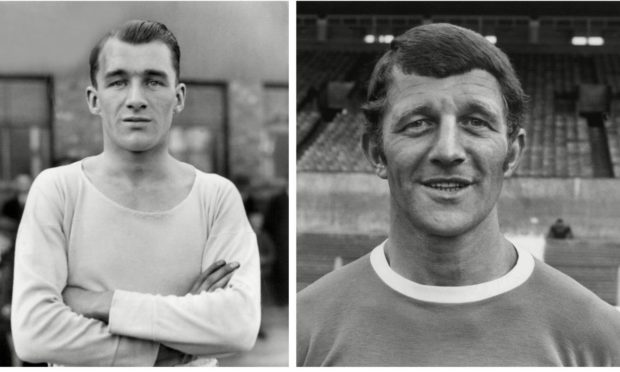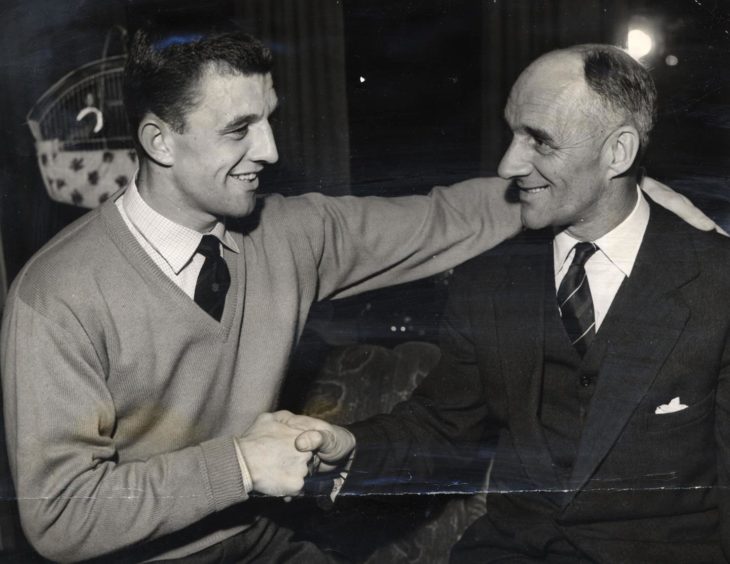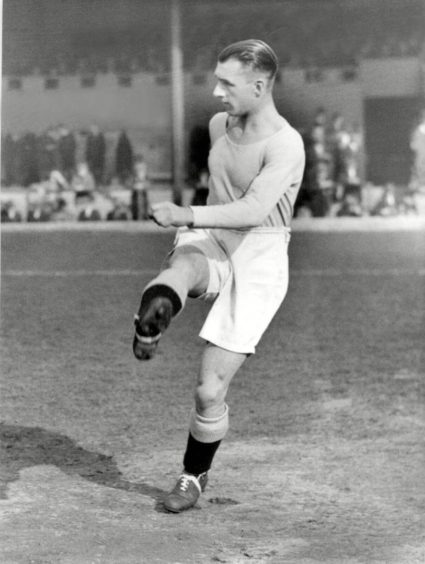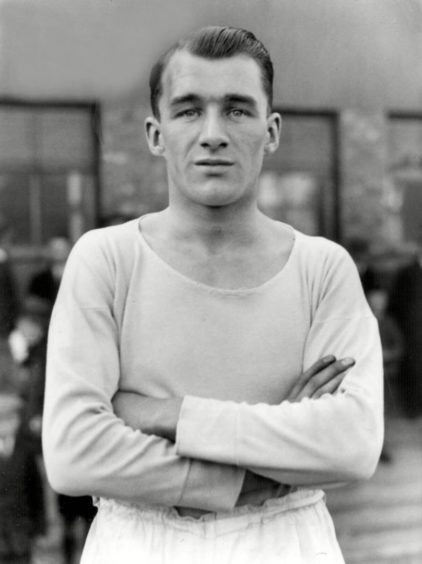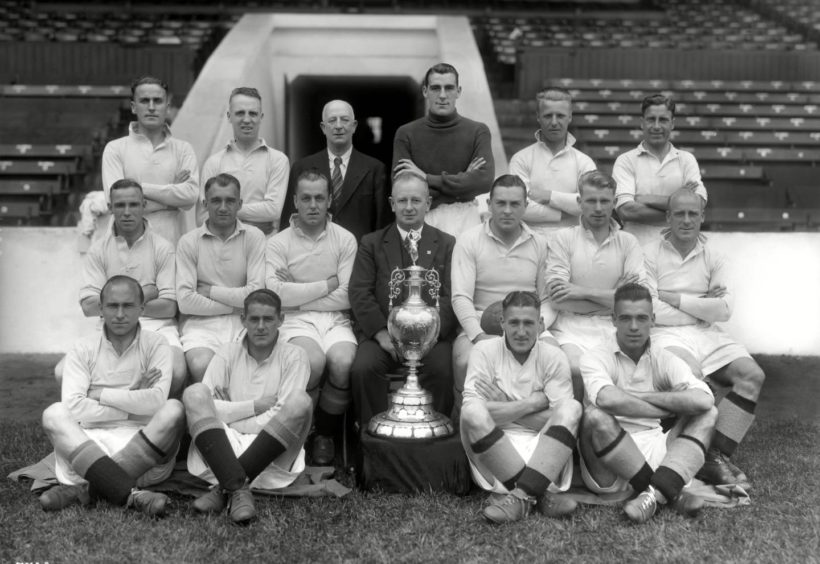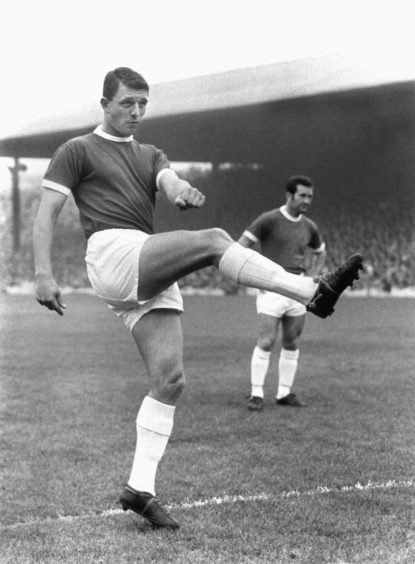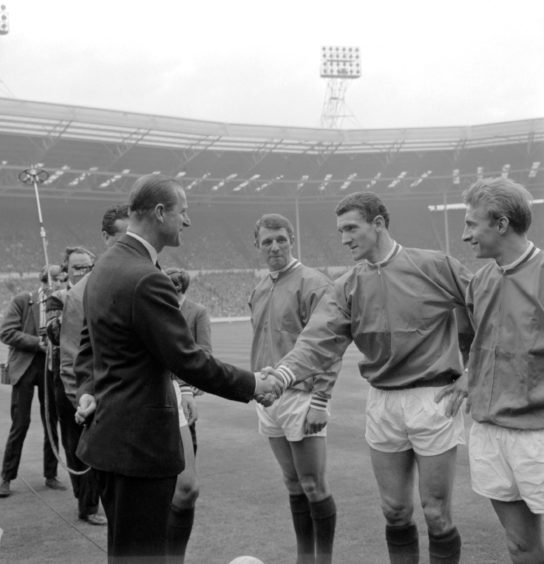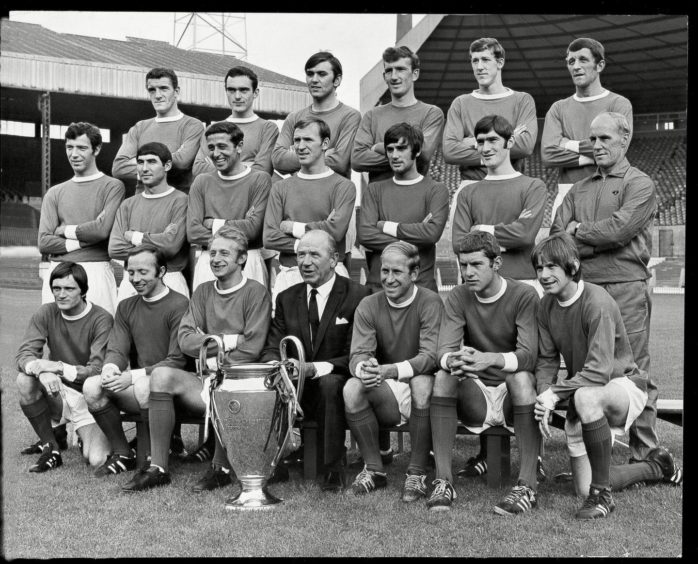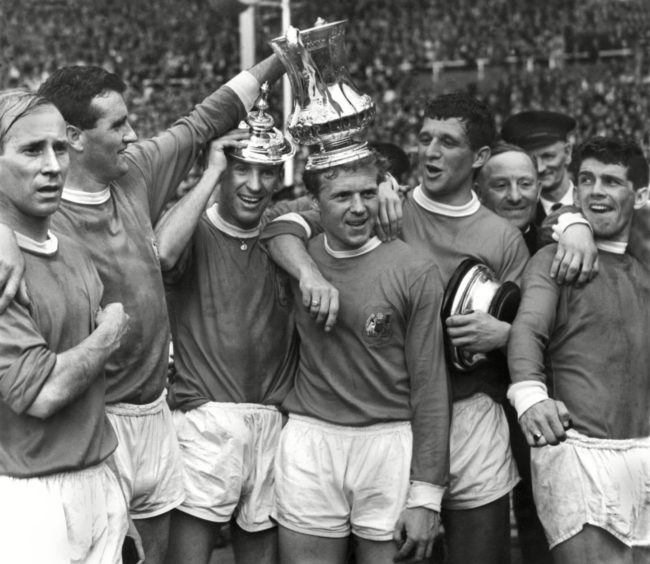Fife-born Alec Herd and his son David stood on opposing sides of the Manchester football divide and were the first father and son FA Cup winners.
Alec, who played in a City team which included Matt Busby, enjoyed an FA Cup final triumph against Portsmouth in the year of David’s birth in 1934.
The father-son duo also made football history on the last day of the 1950-51 season when they played together for Stockport County when Alec was 39 and David was 17.
David was destined to emulate his father’s success.
He went on to become an FA Cup winner with Manchester United when he scored twice in the 1963 win against Leicester.
Matt Busby, his father’s old team-mate and friend, was his manager.
The short list of father-son FA Cup winners now includes Frank Lampard Snr and son Frank; Ian Wright and Shaun Wright-Phillips; and Peter and Kasper Schmeichel.
But Alec and David Herd were the original history-makers.
The life and times of Alec Herd
Alec was born in Bowhill, Fife, in 1911.
His football career began as a striker with Bowhill Juniors.
He joined Hamilton in 1929 where he made 85 appearances and scored 41 goals including a hat-trick in three minutes in a 4-3 win over St Mirren in September 1932.
His goalscoring exploits started to attract attention from bigger clubs and he was sold to Manchester City in 1933 along with his team-mate Jimmy McLuckie.
The City team included England internationals Eric Brook, Sam Cowan, Jackie Bray, Frank Swift and Fred Tilson and former Scotland captain Jimmy McMullan.
The Courier reported: “Hamilton Academicals have at last parted with two of their best.
“Last night McLuckie (left-half) and Herd (inside-left) were transferred to Manchester City.
“No fee was mentioned at the close of this big deal but it is understood it will involve between £2,000 and £3,000 at the very least.
“Negotiations were carried out in Glasgow.
“The players and home officials were interviewed and the result of the discussion was wired to Manchester to a meeting of the City board.
“There was no hitch.”
The Courier said it was not surprising they were going south to City which was among “the most persistent of many English clubs with a liking for the Lanarkshire players”.
Herd has had a wonderful run of scoring success this season.
He has notched six hat-tricks – three in successive games.”
The Courier, February 2 1933
Alec was rated the hardest kicker of a dead ball in English football during his 15 years with Manchester City.
He played close to 300 games for City in all competitions, scoring 125 goals.
The 1933 FA Cup final was the first with numbers
His first season saw City reach the 1933 FA Cup final against Everton where players wore numbers on their shirts for the first time in a competitive match.
The numbers were from 1-22, with Everton wearing one to 11 and City 12-22.
Everton won 3-1 with goals from Jimmy Stein, Dixie Dean and Jimmy Dunn but City would return a year later to lift the trophy with a 2-1 win over Portsmouth.
Over 93,000 fans filled Wembley to watch the final which was refereed by future FIFA president Stanley Rous in his penultimate game as an official.
In the City dressing room, one or two players were tense, including 20-year-old goalkeeper Frank Swift who had made his debut just four months earlier.
Alec was showing no signs of nerves and was buried in his latest novel.
The bookworm Fifer was so relaxed that he managed to miss his team-mates filing out of the dressing room to make their way on to the Wembley pitch.
The City trainer had to go back to get him!
Manchester City: Swift, Barnett, Dale, Busby, Cowan (c), Bray, Toseland, Marshall, Herd, Brook, Tilson.
Portsmouth: Gilfillan, Mackie, Smith, Nichol, Allen (c), Thackeray, Worrall, Smith, Weddle, Easson, Rutherford.
Portsmouth took the lead midway through the first half.
With 74 minutes gone, Eric Brook found Fred Tilson and the City striker lashed home the equaliser.
Alec set up Tilson to score the winner with three minutes to go.
The goalkeeper and his mum both fainted
Swift was overcome with emotion and fainted under his own crossbar at the sound of the final whistle, as did his mother who was the side of the pitch.
She was revived by a small tot of whisky from the wife of the City trainer.
King George V, who was at Wembley, was so concerned that he sent a telegram enquiring about Swift’s health on the Monday after the game.
Alec was part of the first City side to win the First Division title in 1936-37 while rivals Manchester United were relegated.
However, things went horribly wrong the following season.
The champions scored a division-high 80 goals in 42 games but conceded 77 and became the only team to have been relegated the season after winning the title.
Manchester United would ironically win promotion that same season.
Alec was City’s top scorer with 20 goals in the 1938-39 season in Division Two.
The declaration of war in 1939 meant both the Football League and the FA Cup were suspended indefinitely.
Many footballers had signed up to fight in the war and as a result many teams were depleted, and fielded guest players instead.
Alec returned to Scotland to play for Hamilton as a guest player.
He also played for Scotland in one of the unofficial wartime international matches, which was a 5–4 win against England at Hampden in April 1942.
After a nine year gap the league returned to its pre-war format and City started the 1946-47 season in Division Two with Wilf Wild in charge.
Alec scored 11 goals including a solitary strike against Burnley in front of 67,000 fans at Maine Road which was enough to guarantee City promotion to Division One.
His final season with City was 1947–48 before he joined Stockport County on a free transfer where he made 111 league appearances and scored 35 goals.
He retired from the game in 1951.
Alec died in 1982 at the age of 71 and is regarded as one of City’s greatest players.
David Herd followed in his father’s footsteps
Alec Herd sent David’s mother back “up the road” to Hamilton to give birth on April 15 1934 so that David would qualify to play for Scotland.
David grew up locally in Moss Side while his father was playing for City.
He signed for Stockport County as an amateur, going on to make his professional debut, alongside his father, as a 17-year old in April, 1951.
David marked his debut with a goal in a 2-0 defeat of Hartlepool United.
He spent three seasons with County, during which he performed his National Service.
Matt Busby, his father’s old team-mate and friend, wanted to add David to the ranks of his promising Busby Babes but he was out-bid by Arsenal.
He signed for Arsenal in 1954 for £10,000 where he scored 107 goals in 180 matches, including one in the last league match before the 1958 Munich air disaster, which was a 4-5 defeat against Manchester United.
He was capped five times by Scotland between 1958 and 1961.
The Arsenal striker made his debut for Scotland against Wales in Cardiff, which was one of just two matches in which Matt Busby managed the national side.
He equalled the feat of his father who played in a wartime Scotland team in 1942.
David scored his first international goal in his second cap, which was a 2-2 draw with Northern Ireland, at Hampden, 18 days later.
His best individual goal-scoring season was 1960-61, his last at Highbury, when he scored 30 goals in 41 games.
David was also famous for his ferocious shot
David’s main gift was a ferociously powerful shot – once recorded at 72.5mph.
“Hot Shot” Herd finished second to Jimmy Greaves in the First Division scoring charts in 1961, attracting the attentions of Matt Busby, who paid £40,000 for his services, as United continued their rebuilding in the years after Munich.
David scored on his United debuts in the FA Cup, the League Cup and all three European competitions, and on his third league outing for the Reds fired a brace to take his Football League goals tally to 100.
None of these was as valuable as the brace he scored in the 1963 FA Cup Final.
Busby’s men were underdogs for the final against a Leicester side which had finished fourth in the league and boasted the world’s best goalkeeper Gordon Banks.
United had only secured their First Division status in the last week of the season despite having Bobby Charlton and Denis Law in their team.
It was the first match to be played at a fully roofed Wembley Stadium in front of a crowd of almost 100,000.
Leicester: Banks, Sjoberg, Norman, McLintock, King, Appleton (c), Riley, Cross, Keyworth, Gibson, Stringfellow.
Manchester United: Gaskell, Dunne, Cantwell (c), Crerand, Foulkes, Setters, Giles, Quixall, Herd, Law, Charlton.
Leicester were described as having an “Iron Curtain defence to end all Iron Curtains”.
United beat Leicester 3-1 which was the club’s first major trophy for six years and the first trophy they had won since the Munich air disaster.
A second half brace from David and one from Denis Law consigned Leicester to defeat, with Ken Keyworth’s finish proving only to be a consolation.
The Press and Journal headline on Monday was: “This Was a Scottish Cup Final”.
The genius of inside-left Denis Law, the power and authority of Pat Crerand, and the opportunities of centre-forward Dave Herd were the principal ingredients of Manchester United’s magnificent FA Cup success.
Scotland can be proud of the part played by this trio.”
Press and Journal, May 27 1963
The subsequent season, 1963-64, saw the debut of another member of United’s Holy Trinity, 17-year-old George Best who played 26 times and scored six goals.
David helped United to win the English league championship in 1965 and 1967, which was the same year he broke his leg when scoring against Leicester.
The injury put paid to his position in their forward pecking order.
He was awarded a European Cup winner’s medal in May 1968 for his part in United’s campaign but he was a frustrated spectator at the final at Wembley.
David only made eight appearances across all competitions in that season.
In total he scored more than 20 goals in four of his seven seasons with United, and hit the net on 145 occasions in his 265 games.
His partnership with Law produced 290 goals between them in all competitions.
He left Old Trafford in 1968 to join Stoke City
While still at United, Herd bought a garage in Davyhulme, five miles from Old Trafford.
He moved to Stoke City aged 34 in the summer of 1968 and would train in the morning and return to work in the garage in the afternoon.
He ended his playing career with Waterford in Ireland under his old United team-mate Shay Brennan before retiring in 1971.
In total he played 511 club games during his career, scoring 269 goals.
He spent a short period as manager of Lincoln City where he enjoyed moderate success before leaving to focus on his business interests.
There is a train of thought that the work he put in at Lincoln set the foundations for the next manager, Graham Taylor, who attained legendary status with the Imps.
He went on to become a successful businessman before retiring in 1999.
He died in October 2016.
The garage still carries his name.
